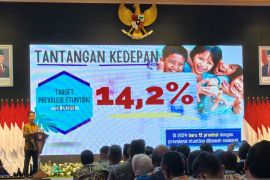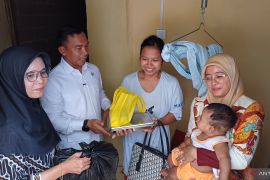Nutritional shortage during this time, often known as the golden era, is highly likely to result in stunting, a condition that impairs a child's physical and intellectual ability.
Stunting impacts not just the child but also his or her family and the country.
According to the World Health Organization, stunting is the delayed growth and development of children caused by poor nutrition, frequent infections, and insufficient psychosocial stimulation.
Stunting has short-term effects in three areas: health, especially high rates of mortality and morbidity, growth and development, and the economy.
Following this, the National Population and Family Planning Board (BKKBN) affirmed that stunting prevention efforts need to be taken from the preconception period until the child is five years of age.
Stunting prevention starts from preconception, before pregnancy, and continues until a child is 59 months old (five years), BKKBN's Deputy for Family Prosperity and Family Empowerment Nopian Andusti stated.
Stunting is not only related to postpartum but it occurs long before a child is born, as the risk of growth disturbances occurs in the womb.
Hence, stunting prevention endeavors need to be undertaken from the preconception period until the child is 59 months of age.
In keeping with Presidential Regulation Number 72 of 2021 concerning Accelerating the Reduction of Stunting, the national strategy to accelerate stunting reduction consists of efforts to reduce stunting prevalence and increase preparation for family life, Andusti highlighted.
The strategy also aims to provide adequate nutrition, improve parenting management, increase access to and quality of health services, and expand access to drinking water and sanitation.
According to Andusti, prospective parents, brides, and grooms need to have an understanding of reproductive health and family life planning as well as a shared awareness within the family to help the baby's growth and development optimally.
He added that parents and all parties bear the crucial responsibility of caring for toddlers and children, so this needs to be a primary concern.
"If there are mistakes in parenting methods from the start, then this will have a negative impact on the child's growth and development in the future," he pointed out.
He said that parents and families, as the first and primary caregivers, play an important role in the development of human resources.
Parents and families need to gain parenting skills and knowledge. They must understand and facilitate the positive interactions that children need, considering the importance of the first 1,000 days of life for the future of Indonesian children.
Andusti said that BKKBN's Directorate of Toddler and Child Family Development is running a Toddler Family Development Program (BKB), which is seeking to increase the knowledge and skills of parents and other family members in caring for and fostering children's growth and development.
He emphasized the importance of advocacy, promotion, communication, information, and education on parenting in the first 1,000 days of a child's life to accelerate stunting reduction.
These efforts are also important to increase commitment, understanding, and efforts to create the best human resources as well as to secure dedicated stunting budgets at the regional level and explore additional funding opportunities that can be useful for improving human resource quality.
Meanwhile, Head of the National Population and Family Planning Agency (BKKBN) Hasto Wardoyo called on stakeholders to collaborate in activating data to accelerate stunting reduction.
Wardoyo emphasized that accurate and up-to-date data is the key to designing strategies, identifying challenges, and measuring the impacts of interventions. By activating data, measures that are taken can be more accurate.
The agency head emphasized that appropriate utilization of data can proffer maximum benefits and contribute to the making of standardized policies that accommodate all, especially in reducing the stunting rate in Indonesia.
Wardoyo revealed that his agency has a main data source, namely the New Siga (family information system), which is operational data for family planning officers and relevant parties to make interventions in the Family Development, Population, and Family Planning (Bangga Kencana) Program.
He noted that the unmet need for family planning is still a matter of concern, especially health-related reasons that are identified as the main cause of contraceptive discontinuation, namely 55.97 percent, with 13.3 percent found in those in the age group of 30-34 years.
“Unmet need is closely related to the issue of stunting. (It is) because, with family planning, new births of stunted children can be prevented,” he remarked.
The BKKBN head further called for investigation and efforts to prevent stunting with a more comprehensive understanding of the factors that cause unmet needs, such as limited access to nutritious food, lack of education on nutrition, and the lack of quality health services.
Assistance
The National Food Agency (Bapanas) is targeting more than 1.4 million families at risk of stunting in seven provinces in Indonesia to become beneficiaries of phase two of the stunting handling food assistance in 2024.
"Bapanas, along with the National Population and Family Planning Agency (BKKBN), is carrying out strategic efforts to represent the government in making specific interventions for stunting," Bapanas Deputy for Food and Nutritional Insecurity Nyoto Suwignyo remarked.
He stated that the food assistance packages, which contained 10 eggs and the meat of one chicken each, would be distributed in stages six times over the following six months.
Banten, West Java, Central Java, East Java, North Sumatra, North Sulawesi, and East Nusa Tenggara are the seven provinces that will receive priority assistance.
Suwignyo stated that eggs and chicken are procured with the help of the Ministry of State-Owned Enterprises that connects the government to farmers in the target regions.
Meanwhile, the distribution is carried out by state-run food holding ID FOOD, targeting 1,446,089 beneficiary families.
On Friday (March 15), the second phase of the stunting food aid program began at the Jatisampurna Sub-district Government office in Bekasi City, West Java.
Yanti Susanti, 39, one of the beneficiaries from Jatikarya Village, described the help as a blessing during the Islamic holy month of Ramadan.
"I received assistance once, but it was a long time ago. Today, I got eggs and chicken for suhoor and iftar," she stated.
Stunting reduction is the Indonesian government's priority program that is aimed at bringing down stunting prevalence to 14 percent by 2024.
Indonesia's stunting prevalence declined by 2.8 percentage points to 21.6 percent in 2022, from 24.4 percent in 2021, as per the 2022 Indonesian Nutritional Status Survey (SSGI).
Related news: VP Amin asks officials to collect stunting data
Related news: BKKBN attributes stunting prevalence to living environment quality
Editor: Rahmad Nasution
Copyright © ANTARA 2024












